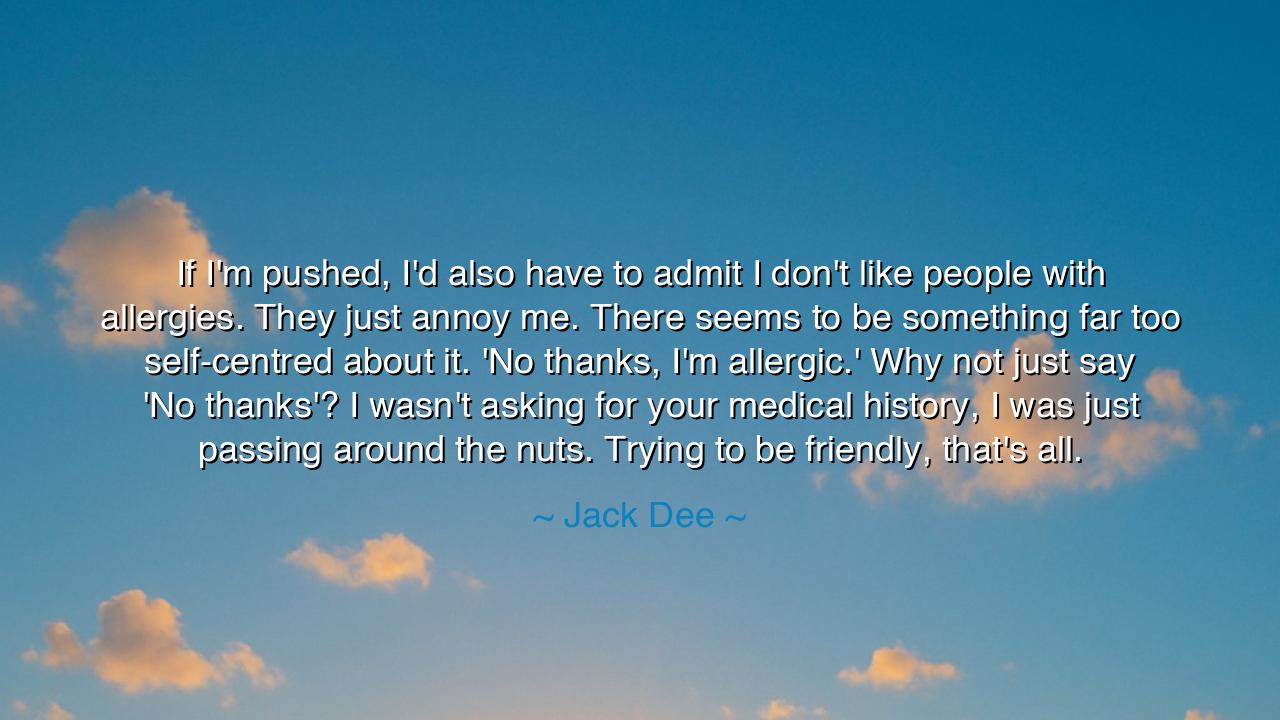
If I'm pushed, I'd also have to admit I don't like people with
If I'm pushed, I'd also have to admit I don't like people with allergies. They just annoy me. There seems to be something far too self-centred about it. 'No thanks, I'm allergic.' Why not just say 'No thanks'? I wasn't asking for your medical history, I was just passing around the nuts. Trying to be friendly, that's all.






The words of Jack Dee—“If I'm pushed, I'd also have to admit I don't like people with allergies. They just annoy me. There seems to be something far too self-centred about it. 'No thanks, I'm allergic.' Why not just say 'No thanks'? I wasn't asking for your medical history, I was just passing around the nuts. Trying to be friendly, that's all.”—may first strike the ear as biting humor, but beneath their sarcasm lies a profound mirror of the human tendency to judge what we do not understand. Jack Dee, the British comedian known for his dry wit and dark reflections on everyday absurdities, often uses mock irritation to reveal deeper truths about social behavior. His jest about people with allergies is, in essence, a satire of impatience and ego, a lampooning of how the comfortable grow intolerant of others’ vulnerabilities.
To grasp the origin and meaning of this quote, we must understand the voice from which it comes. Jack Dee built his comedy on irony and introspection—his jokes often mock himself as much as his subjects. When he declares annoyance toward those with allergies, he does not truly condemn them; rather, he exposes how modern empathy falters in trivial situations. His irritation is performative—a mirror held up to the unspoken thoughts of many who, in their rush for comfort, forget that patience and understanding are the foundations of civility. Beneath his jest, he invites us to examine why compassion so easily gives way to irritation when confronted with others’ differences.
This quote, when stripped of its comedic armor, speaks to a timeless conflict within the human heart: the struggle between self-interest and empathy. The ancients knew this tension well. In the Stoic schools of Athens, philosophers warned that the first test of character is not in grand gestures but in small inconveniences. The man who loses patience at the table, who scorns the fragile, who mocks the suffering—he reveals that his spirit is ruled by pride. Thus, when Dee feigns irritation at the allergic, he forces us to see how often we too have sighed inwardly at others’ needs, dismissing their pain as inconvenience. The humor disarms, but the truth it conceals is sharp as steel: arrogance is the enemy of kindness.
Consider the story of Epictetus, the philosopher born into slavery, who once wrote that one should “bear the defects of others with the same tolerance as one bears their own.” Imagine him at that ancient table, where food was shared among strangers. Would he have scorned the man who declined bread because of an ailment? Never. He would have smiled, recognizing that nature divides burdens unevenly, and that wisdom lies not in ridicule but in grace. Jack Dee’s words, though clothed in jest, summon the same reflection. They remind us that laughter, when honest, can be a teacher greater than sermons, for it reveals our faults without the sting of accusation.
In the modern world, Dee’s mock irritation also points to a subtler form of alienation. We live in an age where communication has quickened, but understanding has slowed. People speak, yet few listen. The allergic person, saying “No thanks, I’m allergic,” is not seeking attention but safety. Yet the impatient ear hears only self-importance. This dissonance between intent and perception mirrors much of society’s unrest—each of us lost in our own perspective, mistaking another’s caution for arrogance, another’s pain for weakness. Dee’s humor, then, is a parody of a self-centered world, where empathy is a dwindling art.
The lesson buried within this jest is one of humility and attentiveness. Before we mock what irritates us, we must ask whether our irritation springs from ignorance. Every person carries unseen struggles, and what seems trivial to one may be a matter of life or death to another. A peanut, a flower, a word—all can wound deeply when misunderstood. Thus, the wise man learns to temper his tongue, to let patience govern his interactions. He knows that respect for others’ limits is a measure of one’s own strength.
And so, my child, when you pass around the metaphorical bowl of nuts in life—your opinions, your kindness, your invitations—do so with gentleness. If someone declines, do not take offense; instead, see in their refusal the story of their survival. Laughter may expose our flaws, but reflection transforms them into wisdom. Jack Dee’s jest is not cruelty—it is a mirror, held so that we might see the smallness of our impatience and the greatness that comes from understanding. The truly civilized spirit is not the one that demands conformity, but the one that welcomes fragility with a smile.
For in the end, respect, like health, is fragile—easily broken, seldom repaired. Guard both with care. Learn to laugh, but more importantly, learn to listen. And remember: the mark of the wise is not that they never grow irritated, but that they turn irritation into insight, and humor into humanity.






AAdministratorAdministrator
Welcome, honored guests. Please leave a comment, we will respond soon